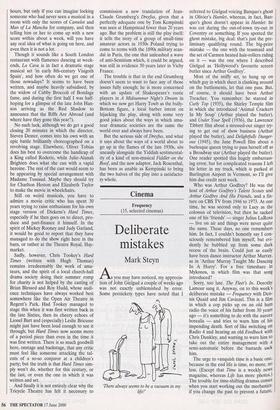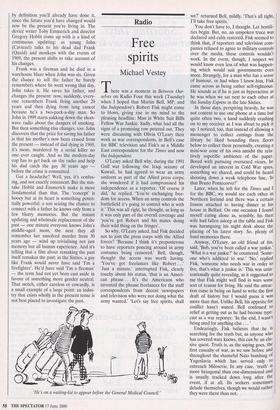Cinema
Frequency (15, selected cinemas)
Deliberate mistakes
Mark Steyn
Ayou may have noticed, my apprecia- tion of John Gielgud a couple of weeks ago was not exactly unblemished by error. Some pernickety types have noted that I
'There always seems to be a vacuum in my life!'
referred to Gielgud voicing Banquo's ghost in Olivier's Hamlet, whereas, in fact, Ban- quo's ghost doesn't appear in Hamlet: he was cut during the out-of-town try-out in Coventry or something. If you spotted the ghost mistake, big deal: that's just the pre- liminary qualifying round. The big-prize mistake — the one with the teasmaid and the set of Carmen heated hair-rollers riding on it — was the one where I described Gielgud as 'Hollywood's favourite screen butler since Arthur Godfrey'.
Most of the sniffy set, so hung up on which guy in which sheet is clanking around on the battlements, let that one pass. But, of course, it should have been Arthur Treacher. You remember: he starred in Curly Top (1935), the Shirley Temple film in which she introduced 'Animal Crackers In My Soup' (Arthur played the butler), and Under Your Spell (1936), the Lawrence Tibbett film about a stressed-out singer try- ing to get out of show business (Arthur played the butler), and Delightfully Danger- ous (1945), the Jane Powell film about a burlesque queen trying to pass herself off as a Broadway star (Arthur played the butler). One reader spotted this hugely embarrass- ing error, but for complicated reasons I left his letter in my truck, which is parked at Burlington Airport in Vermont, so I'll give him due credit next week.
Who was Arthur Godfrey? He was the host of Arthur Godfrey's Talent Scouts and Arthur Godfrey And His Friends, and a fix- ture on CBS TV from 1946 to 1973. At one time, he was second only to Lucy as the colossus of television, but then he sacked one of his 'friends' — singer Julius LaRosa — live on air and things were never quite the same. These days, no one remembers him. In fact, I couldn't honestly say I con- sciously remembered him myself, but evi- dently he bubbled up from some dark recess of the brain. Could just as easily have been dance instructor Arthur Murray, as in 'Arthur Murray Taught Me Dancing In A Hurry'. For a free timeshare in Mykonos, in which film was that song introduced?
Sorry, too late. The Fleet's In. Dorothy Lamour sang it. Anyway, on to this week's deliberate mistake — Frequency with Den- nis Quaid and Jim Caviezel. This is a film in which a cop picks up on an old ham radio the voice of his father from 30 years ago — it's something to do with the aurora borealis — and tries to warn him of his impending death. Sort of like switching on Radio 4 and hearing an old Feedback with Chris DunIdey, and wanting to warn him to take out the entire management with a semi-automatic before the bastards sack him.
The urge to vanquish time is a basic one, because in the end life is time, no more, no less. (Except that Time is a weekly news magazine, whereas Life has more photos.) The trouble for time-shifting dramas comes when you start working out the mechanics: if you change the past to prevent a future, by definition you'll already have done it, since the future you'd have changed would now be the present you're living in. The device writer Toby Emmerich and director Gregory Hoblit come up with is a kind of continuous updating: as young John (Caviezel) talks to his dead dad Frank (Quaid) and monkeys with the events of 1969, the present shifts to take account of his changes.
Frank was a fireman and he died in a warehouse blaze when John was six. Given the chance to tell the father he barely remembers where he went wrong that day, John takes it. He saves his father, and changes the present: now, suddenly, every- one remembers Frank living another 20 years and then dying from lung cancer because he's a two-pack-a-day man. So John in 1999 starts yakking down the short- wave radio about the dangers of smoking. But then something else changes, too: John discovers that the price for saving his father is that his mother's now been erased from the present — instead of dad dying in 1969, it's mom, murdered by a serial killer no one ever caught. And so the modern-day cop has to get back on the radio and help his dad catch the guy 30 years ago — before the crime is committed.
Got a headache? Well, yes, it's confus- ing, and not exactly consistent. But the mis- take Hoblit and Emmerich make is more fundamental than that. The 'concept' is hooey but at its heart is something poten- tially powerful: a son seizing the chance to connect with a father he knows only from a few blurry memories. But the instant updating and wholesale replacement of the past — one minute everyone knows John's middle-aged mom, the next they all remember her unsolved murder from 30 years ago — wind up trivialising not just memory but all human experience. And it's telling that a film about remaking the past itself remakes the past: in the Sixties, a guy like Frank would never have said 'I'm a firefighter'. He'd have said 'I'm a fireman' — the term had not yet been cast aside in favour of something more gender neutral. That switch, either careless or cowardly, is a small example of a large point: an indus- try that exists wholly in the present tense is not best placed to investigate the past.











































































 Previous page
Previous page